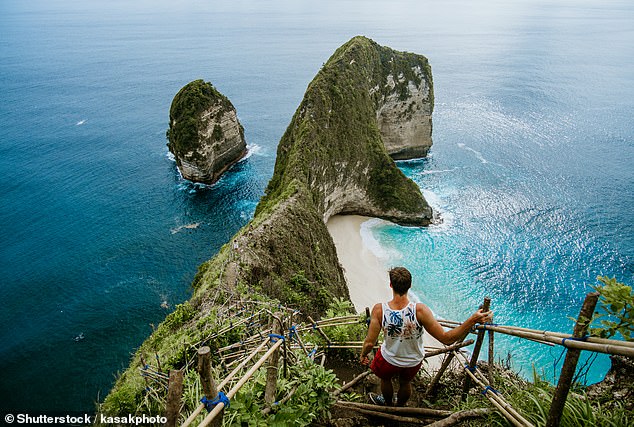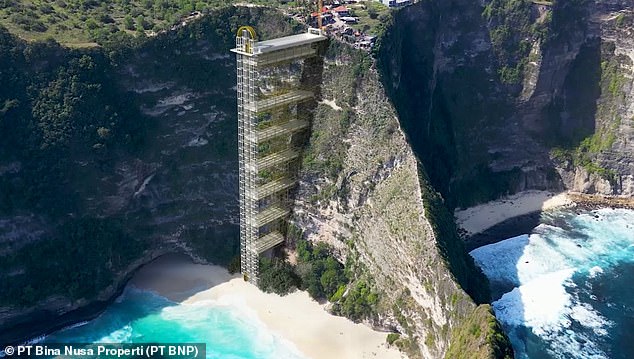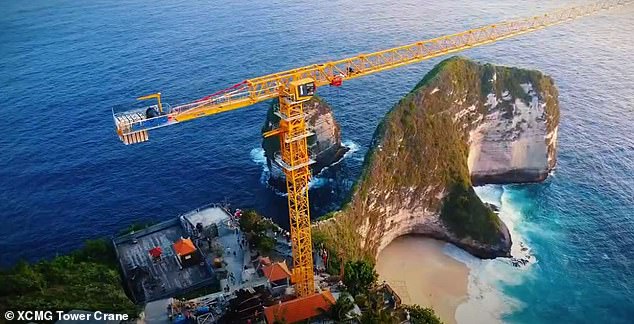Kelingking is ranked as one of the world’s most beautiful beaches but a new Chinese-backed project there proves Bali is losing its magic as an untouched tropical paradise
With its towering limestone cliffs and crystal clear turquoise waters, Kelingking is regularly voted the most beautiful beach in the world.
But few tourists actually reach the pristine white beaches of Indonesia’s idyllic Nusa Penida, a short boat ride from Bali.
That’s because the beach can only be reached via a grueling 30-minute descent down hundreds of rickety steps carved into the steep hillside.
However, that is set to change with the construction of a 182-metre-long glass elevator and a viewing platform along the steep cliff face.
The project, which is being carried out by the local government with the help of a Chinese company, is symbolic of the tension between Bali’s natural, unspoiled beauty and the drive for modern development to attract wealthy foreign tourists.
Niluh Djelantik, a recently elected senator and prominent social media activist in Bali, strongly criticized the ugly structure, which will be almost three times as tall as the Sydney Opera House.
“You could give me $100 million and I would still never get in that elevator,” Ms. Djelantik told the ABC.
‘Kelingking Beach is beautiful as it is, and for some people it means making the effort to walk down to see the beauty below.’
With its towering limestone cliffs and crystal clear turquoise waters, Kelingking is regularly voted the most beautiful beach in the world

But few tourists actually reach the pristine white sands of the Indonesian idyll of Nusa Penida, a short boat ride from Bali, as the beach can only be reached via a gruelling 30-minute descent down hundreds of rickety steps carved into the steep hillside.
‘You have to earn it, you don’t just put an elevator there.’
Indonesia is divided over the issue of overdevelopment. The government on Monday imposed a temporary ban on the construction of hotels, villas and nightclubs in some busy areas of Bali.
These areas include Denpasar, Badung, Gianyar and Tabanan, typical destinations for many Australian holidaymakers.
Sang Made Mahendra Jaya, the island’s interim governor, said he wanted to “reform” tourism and suggested the ban could last for a maximum of two years, but could possibly be extended to 10 years.
According to Luhut Pandjaitan, senior minister for tourism, there are currently around 200,000 foreigners living in Bali, causing problems such as crime, overdevelopment and competition for jobs.
“Foreign tourists who are a problem here, like drugs, gangs and other things, we can deport them from Indonesia and Bali. We don’t want them to come to Bali anymore,” he said in an English-language video clip.
The construction freeze is part of the government’s efforts to reform tourism in Bali, with an emphasis on sustainability and quality jobs, while preserving the island’s culture.
Mr Pandjaitan said that ‘quality is more important than numbers’.
“We don’t want rice fields to turn into villas or nudist clubs,” he said last month at the Indonesia Quality Tourism Conference.

However, the pristine beauty of Kelingking Beach is set to change with the construction of a 182-metre-long glass elevator and viewing platform along the sheer cliff face (pictured: an artist’s rendering)

The project, led by the local government with the help of a Chinese company, has become a symbol of the tension between Bali’s natural, unspoiled beauty and the drive for modern development to attract wealthy foreign tourists.
He added: ‘We want to preserve Balinese culture, because without their culture Bali is no longer a paradise island.’
Foreign arrivals to Bali have surged since the country reopened to tourism following the COVID-19 pandemic. Videos of misbehaving tourists often go viral, angering residents and prompting harsh reactions from social media users in Indonesia.
Government figures show that 2.9 million foreign visitors arrived through Bali airport in the first half of the year, accounting for 65 percent of the total number of foreign visitors arriving in Indonesia by air.
Figures show there were 541 hotels in Bali last year, compared to 507 in 2019.
